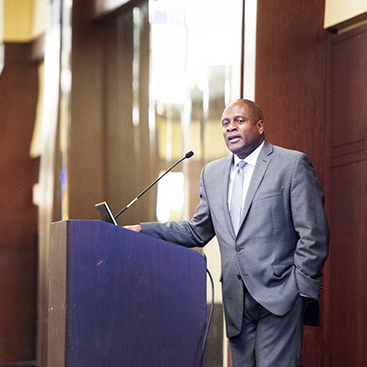Douglas Brooks (’99)
Renowned advocate for HIV/AIDS awareness Douglas Brooks reflects on his time as the former director of the White House's Office of National AIDS Policy
 Douglas Brooks (‘99) has worked tirelessly to serve people living with, and at greatest risk for, HIV/AIDS. Most recently, Brooks served as the director of the Office of National AIDS Policy (ONAP) from 2014 to 2016. He was the first HIV-positive African American to hold the position.
Douglas Brooks (‘99) has worked tirelessly to serve people living with, and at greatest risk for, HIV/AIDS. Most recently, Brooks served as the director of the Office of National AIDS Policy (ONAP) from 2014 to 2016. He was the first HIV-positive African American to hold the position.
During his appointment to the office, Brooks said, “Despite our best efforts, the stigmatization, discrimination, and denial persist. Moreover, some folks living with HIV don’t seek care because of their own fears. We need smart, caring people to get informed and to talk about HIV with their friends and families. We can end this epidemic, but we need the public’s help.”
As director, he helped implement the goals of the National HIV/AIDS Strategy and the HIV Care Continuum initiative. Currently, over 1.2 million people in the US are living with HIV, and 1 in 8 of them don’t know it yet, according to the Centers for Disease Control and Prevention. Brooks was first introduced to the world of social work as an intern with the Justice Resource Institute (JRI) in Boston, where he worked for nearly two decades, most recently as senior vice president for community, health, and public policy. Andy Pond (‘93), president of JRI has seen Brooks as a leader since the day they met. He says, “People are drawn to him. He’s very passionate, but also very polished, and he can communicate with anybody at any level.”
Brooks has several other impressive credentials to his name. Previously, he was a visiting fellow at the McCormack School’s Center for Social Policy at the University of Massachusetts. He consulted with South Africa’s Eastern Cape Province Department of Health on strategies for developing partnerships among government, nongovernmental organizations, and people living with HIV. He served on the boards of the Massachusetts League of Community Health Centers, AIDS United, and the National Black Gay Men’s Advocacy Coalition. He was also appointed to the Presidential Advisory Council on HIV/AIDS in 2010.
Brooks treasures the training he received at BUSSW. “There is no doubt that the experience has been vital in the work I’ve undertaken and has helped me land where I am today,” he says.